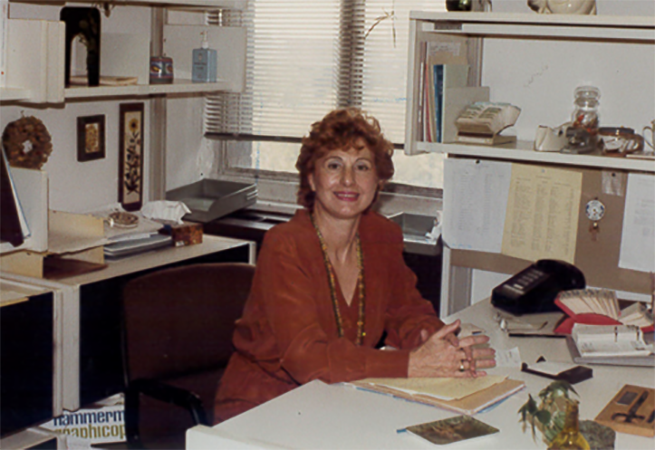
I am still reeling from the very sad news about my dear friend, mentor, and fellow Sigma past president, Dr. Lucie S. Kelly. The thing I hate most about death is not its certainty—we are, after all, biological beings, with a beginning and an end. Rather it’s the uncertainty—When? Where? How? And in whose company? It is distressing that just two days before Lucie’s death, I was at the 45th Biennial Convention, thinking about her and even sharing “Lucie” stories with many of you. How I wish now that I had rented a car and driven the less than 100 miles to Charlottesville, Virginia, USA, to say “goodbye” and thank her for being such an important part of my life.
Lucie recruited me to work with her at Columbia University School of Public Health in 1977. It was my first post-PhD position. I had none of the qualifications listed for the position, but she offered it to me anyway the day after my interview. (It taught me a lot about risk-taking.) During the years that we worked together, she re-introduced me to the nursing profession after a seven-year absence, in which I pursued my PhD in Anthropology. Since we met, I seldom made a career decision without consulting her.
She was a brilliant and well-known nurse—not as a researcher/scholar (though she was extraordinarily intelligent and insightful) and not as a Dean or Chief Nursing Officer (though she had held both positions and viewed both as a little restrictive and sometimes even boring). Rather, her celebrity derived from her belief in the leadership promise of nursing and her commitment to act on it in a public forum.
She was deeply concerned about the public’s image of nursing as secondary to physicians and the frustrating capacity of nurses to perpetuate that image (hence the unfortunate name Sigma’s early journal,
Image, mercifully easing into the
Journal of Nursing Scholarship in 1999). Not having a humble bone in her own body, she could not suffer obsequious, deferential, timid, or self-effacing behavior in nurses. And while often frustrated by the hegemony of physicians in both healthcare practice and academia, she never failed to earn their respect.
Lucie was the consummate mentor. Her guidance included everything from identifying opportunities to how to handle certain situations, what to say and how to say it, and yes, what to wear. In her mind, these were all equally important. She was particularly attentive to grooming and comportment, having no tolerance for the pastel polyester pantsuits of the time, always faulting on the side of designer clothes, good jewelry, and lots of glitter. I marveled to see her arrive five minutes after a meeting of university officials had begun, watching them scramble to seat her strategically at the table. She would casually drop her mink or chinchilla on the back of her chair and “apologize” (sort of) for “any” disruption she “may” have created. While some found her attention to appearance distracting and perhaps superficial, it was clear to those of us who really knew her that it was girded by intention and substance. She believed that if you wanted to let the world know the intellectual foundation and enormous contribution of our profession, you first have to get on stage.
It was during Lucie’s leadership that Sigma was inspired to move from a national to an international organization. It was Lucie’s mentorship that inspired (or required?) me to become president. Together, Lucie and my good friend, Nancy Hazard, brand new in her position succeeding the inimitable Nell Watts, influenced me to embrace clinical scholarship as the focus of my presidency. Both of them saw it as an opportunity to enhance the professionalization (and the image) of clinicians as they joined their academic counterparts at Sigma’s table. Those days were all about the future—thinking about it, planning for it, etc. Not just about the future of our venerable organization, though. It was about the future of nursing leadership, united throughout the world by a magnificent obsession, called Sigma Theta Tau International Honor Society of Nursing, destined to create and sustain a healthy planet.
This biennium, I was surprised to find myself first in line, the most senior past president, leading those presidents who succeeded me across the floor, as we began the opening plenary session. I was mentally catapulted to the time when I had been last in line, preceded by Sister Rosemary Donley, Billye J. Brown, Lucie S. Kelly, Beth C. Vaughan-Wrobel, Angela Barron McBride, and Faye L. Bower, each building on the work of the Founders and their predecessor presidents. I wondered, how could this time have passed so quickly?
With deep sadness (I will miss our occasional chats) but with even deeper gratitude, I offer this small public tribute to Dr. Lucie Kelly, for her wisdom, her passion, and her sparkle. She made, and continues to make, each and all of us better nurses and better leaders.
Melanie Dreher, PhD, RN, FAAN, served as Sigma’s president from 1995-1997 and is a member of Beta Zeta at-Large Chapter and Gamma Chapter. (North American Region)